In the 2013 provincial election, Christy Clark’s Liberals promised that exporting liquefied natural gas (LNG) to Asia would provide jobs and expand government revenues.
A year and a half later this boom is nowhere to be seen.
Fifteen liquefying plants and pipelines have been promoted. Six were reported to be on the verge of starting construction. But in early October, Petronas — the company closest to seeking regulatory approval — announced that it was considering shelving its proposal.
The Malaysian government-owned corporation wanted assurances that provincial and federal taxes and royalties would be kept low and that the company could bring in workers from abroad to construct and operate its facilities.
Then on October 21 the provincial government announced that tax rates and royalties on LNG operations would be slashed, and that the public should understand that if these projects proceeded, significant public revenues could not be expected for 15 years.
All of the proposed projects have faced strong opposition from Indigenous people and local communities to pipelines, liquefying plants and increasing tanker traffic.
The most widely promoted LNG terminal in Kitimat is in doubt after a substantial majority in this industrial city voted against the proposal. (People living in the adjacent native reserves who were expected to vote overwhelmingly against the LNG project did not get a vote in this referendum.)
Kitimat showed that when issues are openly and thoroughly debated, the communities most dependent on industrial employment will vote against projects that damage the environment.
The B.C. and federal governments as well as the corporate media continue to promote LNG as the key to future employment and increased public revenues. But even without the prospect of blockades, lengthy public hearings and litigation, the profitability of LNG exports is dubious.
Each proposal for pipelines and liquefying plants requires billions in investments. Energy prices, which had been expected to rise, are falling. China has just agreed to long term oil and gas imports from Russia.
To meet Asia’s natural gas needs, fracking in Canada would have to massively expand.
Horizontal drilling and hydraulic fracturing have substantially higher costs than gas from conventional fields. And China appears to have more frackable gas than Canada and the U.S. combined.
If fracking is as benign as its promoters claim, won’t China develop its own sources?
If China concludes that fracking is too much of a threat to water supplies, agriculture and human habitation, should we continue fracking in Canada?
LNG exports are accompanied by heavy environmental and political costs. Constructing thousands of miles of pipelines and transporting natural gas through mountainous terrain requires so much energy that Canada could not possibly meet the Copenhagen reduced carbon emissions targets (let alone the earlier stronger Kyoto targets).
Despite massive corporate spending to deny that climate change is a result of carbon dioxide emissions, majorities nearly everywhere — including the U.S. — now accept the science and expect governments and industry to take action.
As polar ice caps melt faster than predicted, as sea levels rise and oceans become more acidic, as extreme weather events become more frequent and more destructive, people can be expected to demand that the countries responsible be made to pay.
If carbon emissions in Canada continue to rise a public backlash will build within the country. People in other countries may demand that Canadian products be boycotted. Governments will be pushed to demand sanctions. Civil actions against Canada and energy companies are already being filed.
The consequences of focusing on LNG were predictable at the time of the provincial election. Unfortunately the opposition NDP had concluded that they would easily win by avoiding contentious issues.
Opposition leader Adrian Dix at one point did announce that if elected the NDP would oppose the proposed doubling of the Kinder Morgan oil pipeline. The party then never explained why, dropping the issue for the rest of the campaign.
With no coherent opposition, Clark was able to claim that she stood for jobs and the environment. Although the prospect of millions in profits from LNG exports sounded good, it should have been obvious that burning more fossil fuels came with substantial costs.
Aside from potential profits, the benefits of LNG exports have been grossly exaggerated.
Once constructed pipelines and LNG plants require little labour. Far more industrial jobs would be created by turning to solar, wave and wind power. More jobs would be created by increasing public spending on public transit and shifting to geo-thermal power for heating and air conditioning.
Promoting local agriculture, regional food processing, clothing, footwear, furniture and building materials for local markets would generate additional employment. So would reconfiguring cities to make walking and cycling in daily life more practical.
What is now clear is that Clark’s Liberals did not actually promise to do anything in the 2013 election. The B.C. Liberals like the federal Conservatives are content to leave the environment, jobs and future public revenues to Big Capital and the profit motive.
Al Engler before retiring was President of local 400 Marine Section ILWU-Canada. He is author of Apostles of Greed, Capitalism and the Myth of the Individual in the Market (1995), Economic Democracy, the Working Class Alternative to Capitalism (2010) and a co-author of The New Commune-ist Manifesto, Workers of the World it Really is Time to Unite (2013).
Photo: flickr/Chris Yakimov




